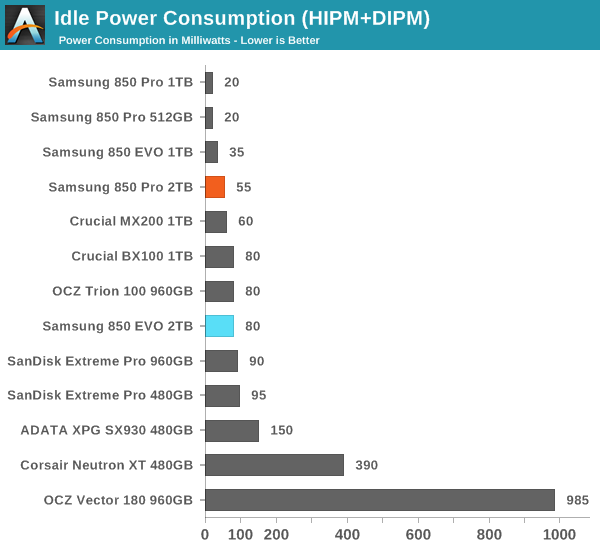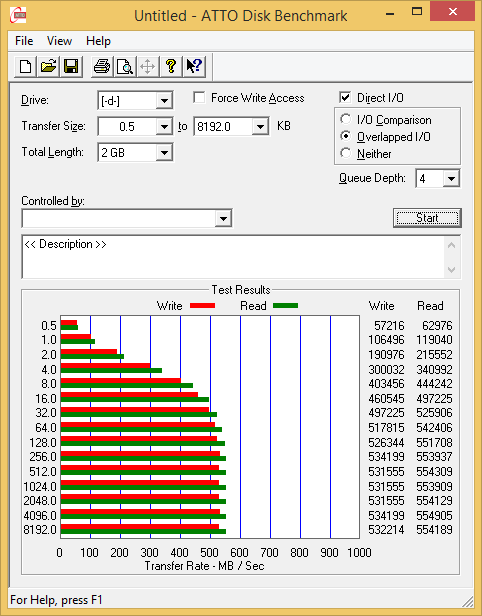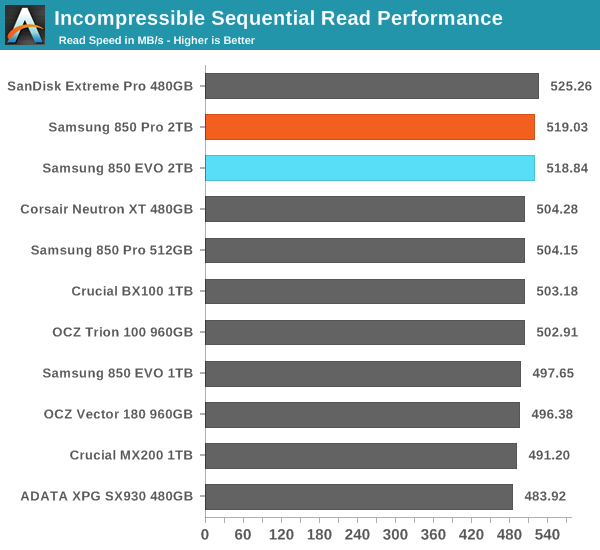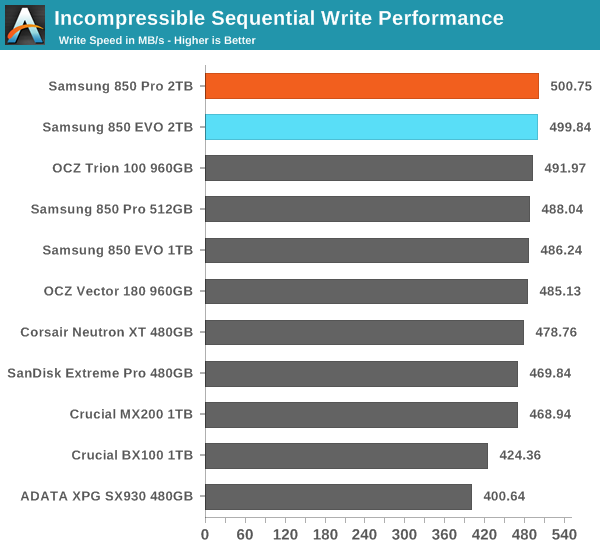The 2TB Samsung 850 Pro & EVO SSD Review
by Kristian Vättö on July 23, 2015 10:00 AM ESTIdle Power Consumption
Since we truncate idle times to 25µs in our Storage Bench traces, they don't give a fully accurate picture of real world power consumption as idle power consumption is not taken properly into account. Hence I'm still reporting idle power consumption as a separate benchmark because it's one of the most critical metrics when it comes evaluating an SSD for mobile use.
Unfortunately I still don't have a way to test DevSleep power consumption due to lack of platform support, but my testbed supports HIPM+DIPM power commands (also referred to as Slumber power), so the results give a rather accurate picture of real-world idle power consumption.

Idle power consumption is increased by a rather large margin. With a beefier DRAM controller and more DRAM drawing power, I was expecting higher idle power draw, but not over twice the power. Still, the Pro and EVO are among the most power efficient drives under idle, making them good for mobile use.
ATTO - Transfer Size vs Performance
ATTO is a handy tool for quickly measuring performance across various transfer sizes and it's also freeware that can easily be run by the end-user.
 |
|||||||||
AS-SSD Incompressible Sequential Performance
Similar to ATTO, AS-SSD is freeware as well and uses incompressible data for all of its transfers, making it a valuable tool when testing drives with built-in compression engines (e.g. SandForce).












66 Comments
View All Comments
vFunct - Thursday, July 23, 2015 - link
Any info about the well known TRIM bug in these drives?vFunct - Thursday, July 23, 2015 - link
TRIM bug reported here: https://blog.algolia.com/when-solid-state-drives-a...and here:
https://bugs.launchpad.net/ubuntu/+source/fstrim/+...
Kristian Vättö - Thursday, July 23, 2015 - link
The bug turned out to be in the Linux kernel, not in Samsung SSDs, as you can see in the first link once you scroll down the updates. Samsung has developed a kernel patch to fix the issue too.BillyONeal - Thursday, July 23, 2015 - link
Well they patched the kernel to work around the firmware bug; but that doesn't mean it was a kernel bug.Kristian Vättö - Thursday, July 23, 2015 - link
There was never a problem with TRIM under Windows or OS X.DanNeely - Thursday, July 23, 2015 - link
IF you follow through to the mailing list discussion for the bug fix, the problem is with the kernel overwriting a pointer when it shouldn't be. If I'm following it correctly, it impacts any SSD brand in RAID0 with trim enabled.leexgx - Thursday, July 23, 2015 - link
did not affect the Intel SSDsmooninite - Thursday, July 23, 2015 - link
Kristian,There are two forms of TRIM these days. The original, Windows-supported, inline TRIM and the latest, queued TRIM. The latter is what is the problem on Samsung drives. I encourage you to fully investigate the issue.
Inline TRIM is known to cause delays with certain drives and certain host systems because it can take over IO on a drive and freeze other commands until TRIM is complete. The number of drives and systems effected is quite low, but it is enough for some people to disable TRIM or use a nightly TRIM script (fstrim).
sustainednotburst - Friday, July 24, 2015 - link
Algolia stated Queued Trim is disabled on their systems, so its not related to Queued Trim.editorsorgtfo - Thursday, July 23, 2015 - link
That was my first reaction, too. But judging from the message on the mailing list and the patch, it is indeed a kernel issue and not specific to Samsung drives. It seems so stem from using queued TRIM on software RAID0, which is a moderately questionable configuration anyway. I guess Algolia did not tell the whole (probably embarrassing) story since there is only one mention of Linux software RAID in the entire article. Maybe they didn't configure their Intel drives the same way?I was set on an Intel 730 for a 7mm SATA role up until a few minutes ago because I had read about this, too. But in light of this, one can probably use Kristian's "best 6Gbps SATA SSD" without excessive worry.